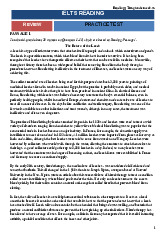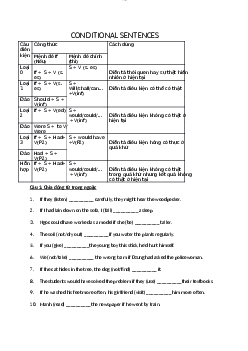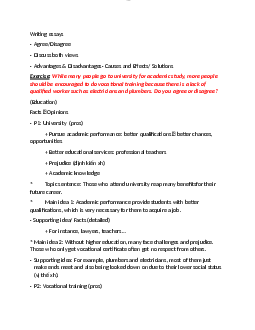








Preview text:
ĐỀ BÀI: Discussing about the conflicts between parents and young people nowadays
INDEX
I. REALITIES OF THE CONFLICTS BETWEEN PARENTS AND CHILDREN 1
II. REASONS LEAD TO THE CONFLICTS AND WAYS HOW TO
III.ROLE OF REDUCING THE CONFLICTS IN FAMILY LIFE 7
1
INTRODUCTION
Conflict exists wherever human relations are present, even more so in a parent - child relationship. When a child begins to become adolescence, it will appear to be a rise in conflicts between the adolescent and parents. The amount of conflict differs from family to family is depended on many factors. It is mainly due to the changing characteristics and growing of the adolescent and the way that the rest of the family adjusts to these changes. However, conflicts are not abnormal, because when two unique perspectives meet, it is certain to be some disagreement.
Realizing the importance of solving the conflicts between parents and children in today's family life, we have decided to choose the topic “Discussing about the conflicts between parents and young people nowadays” to be the theme for our group's assignment.
BODY
I. REALITIES OF THE CONFLICTS BETWEEN PARENTS AND CHILDREN
Starting with the first fact, parents are always in conflict with their children about fashion, thinking, personality, and lifestyle.
The disagreement that we often see is about the way young people dress. Fathers and mothers often tend to dress simply, neatly and delicately; they show off less their individuality because of thrift. In contrast to them, teenagers have strong personalities, always want to express themselves with outstanding appearance and style.
When studying the group exercise, we accidentally came across and heard a female friend talking with her friends about her parents’ complaint. She said: “Every time I put on makeup and dress up to go to an important party with my family, my parents always kept to pay attention and look at me. Later, they asked me: "Isn't there a neater outfit?", "What do you wear to look so old!", "The makeup is too flashy". Then my parents forced me to change each set of clothes one by one until they were satisfied. Therefore, I have been arguing with my parents more and more and I'm not interested in going to parties with them anymore”.
Moreover, the conflicts between two generations are always present in our daily life. Parents assume that when they were young, they had to live frugally, work quickly, but they were sure not to waste time. Meanwhile, the children have the mindset of "YOLO" - meaning you only live once so they always are interested in new experience or adventure and want to enjoy their youth before they have a job, family and so on. In this situation, both of them don’t give up and assert that their perspectives are right.
Personality conflicts are also an issue worth discussing here. If parents are often forbidding, they will make their children uncomfortable and constrained while they are at the age of be active, open, and willingly dedicated. According to a report from a local newspaper in Vietnam, 82% teens said that their parents did not understand them, 76.3% teens said that their family did not trust them and 66.8% teens said that their family forbade them from making friends. This is sad reality for the contrast in personality between children and parents.
II. REASONS LEAD TO THE CONFLICTS AND WAYS HOW TO
SOLVE THEM
1. In terms of children
Firstly, puberty occurs in 3 stages: from 9 to 12 age, from 12 to 15 age and the most powerful stages: from 15 to 18 age.
The most important psychosocial changes in puberty and early adolescence are the emergence of abstract thinking, the growing ability of absorbing the perspectives or viewpoints of others, the increasing ability of introspection and the development of personal and sexual identity.
Their body is adjusting to all the new hormones, so is their mind. During puberty, teeangers might feel confused or have strong emotions that they have never experienced before. Their mood change more frequently, quickly and randomly. It is common for them to feel confused, scared or angry.
Whether parents like it or not, teeangers change their behavior, their attitudes, their likes and their dislikes. Sometimes, the parents’ demands make them uncomfortable and feel pressured. These changes occur throughout childhood but are mostly pronounced during adolescence. That is reason why it is hard for teenager to obey their parents’ opinions. As a result, teenagers will act by their own way. They think they can decide everything exactly without parental intervention. Frequent disagreements cause the conflicts between parents and teenagers
Solution for this is that children should reading books about psychology, watch education program.
Secondly, life skill can be defined as abilities that enable humans to deal effectively with the demands and challenges of life.
Life skills provide teenagers with important tools for development, such as independent thinking, ways to socialize and make new friends, and how to take action in situations that their parents or teachers may not be around to help or intervene.
And if teenagers do not have any life skills:
They can make many wrong decisions due to impulsiveness
They can not predict every possible situation which they must face from their own decisions.
They easily feel negative and so they will have wrong thinking and lifestyle.
Meanwhile, as mentioned, the psychological changes of puberty make children sensitive and difficult to absorb the opinions of others. If the children have no life skills and act on instinct, all advice and parental interventions are meaningless. Every parent wants the best for their child, but teenagers tend to think it is unnecessary. That is when the conflict happens.
Solution for this is that children should take part in experiential activities and club for training life skill. The World Health Organization defines life skills as “The abilities for adaptive and positive behavior that enable individuals to deal effectively with the demands and challenges of everyday life”. As teens grow into their independence, they need to learn social - emotional skills.
Here are list of life skills that teeangers should have:
- Critical thinking and creative thinking.- Decision making and problem solving.
- Communication skills and interpersonal relations.
- Coping with emotions and stress.
- Self - awareness and empathy.
Thirdly, today, society is developing strongly that requires everyone, especially young people, to adapt to catch up with all trends. Pressure can come from many aspects, but this is mainly academic pressure. We have many types of schools, many different learning methods from traditional methods, however, most of children in Vietnamese family have to obey methods that have be chosen by their parents.
As usual, teenagers study at school 8 hours a day, not including some of educational activities. That means they spend half of a day for studying. The remain is too little for them to meet some personal demands such as entertainment, interacting, making friends, relaxing and so on.
Meanwhile, parents mainly impose on their children’s academic performance and tend to be not satisfied when teenagers do not achieve the expecting results. This puts pressure on teenagers. Teenagers will feel bad, alone and depressed. Recent statistics show that 54,7% children are under pressure and do not want to share with each other, especially parents, about their feeling. Parents have tend to impose, teenagers are stress. That means conflict is become worse.
Solution for this is that children should learn to stay calm and control their emotion.
Lastly, social media (or social network) is very common. Besides the positive effects, it also has many negative effects on young people. The more diverse information are, the more complicated teenagers make. Because they are not mature enough to divide information into different sources, teenagers can be carried away by the majority without knowing things happening are right or wrong, appropriate or inappropriate. Notably, the fact shows that, currently, there are many heartbreaking cases about social morality, including the relationship between parents and children. Conflict is inevitable but many young people choose suicide as the only way to solve, which makes story become worse.
When it is continue to be posted on social media, children easily carry away and mistakenly think that all their decisions are completely right. No matter what the parents say, the kids ignore it and respond that: “I've grown up”. Even if the children's decisions are wrong or unreasonable, they still insist on their opinion. Being influenced by many opposing opinions, teenagers become more and more conservative. They will no longer respect and listen to their parents’ opinion. From that, the conflicts between them and their parents will be continued.
Solution for this is that children should limit to contact with social media and use social media for the right and meaningful purposes
2. In terms of parents
Firstly, the difference in lifestyle and beliefs is main reason lead to the conflict between parents and children. Nowadays, we are living in a modern society, however, there are still many families have a conservative mind, especially in rural areas. For example, in Vietnam, parents have a traditional way of educating while society tends to integrate the world. It is the cause of the difference in thinking ability and lifestyle between two generations. In particular, the traditional way of education also affect the child’s ability to think and be independent. At a young age, children can listen to their parents. However, when they grow up, they want to be more independent, create their own opinions, and make their own decisions have their own thoughts. Therefor, the traditional education is no longer reasonable. Even, it can cause the unworthy conflict between parents and children. Then it leads to be emotional separation in the family, parents and children do not understand, sympathize each other.
Between parents and children exists different thinking and lifestyle so the simple solution for this is that parents need to accept their child’s lifestyle and thinking if it is appropriate. By the same time, they should absorb modern lifestyle, have flexible beliefs suitable with modern society to have a multidimensional view of the problem your child and know the reason why your child feels that way. Sometimes, if they had free time, they could tell to their kids about their life before or listen to their child’s worries and sorrows as well as joys. Sharing experience helps two generation understand and sympathize each other.
Secondly, in some Vietnamese families, parents expect their children to obey them. If children resist or disobey, they will be punished by scolding or spanking. When kids want to do something, they need their parents' permission. This is the reasons why Vietnamese children are mostly tend to lose their inherent independence and lack of soft skills.
Besides, some Vietnamese parents often ignore children’s opinions and think that listening to children is not important. They feel what they do is right and good for their children without understanding their children especially in professional matters. Currently, society has emerged many new job related to technology like tiktoker, livestreamer, youtuber,.. Many young people like this job because it is not only suitable for their hobbies but also has a great income. However, some parents do not want their children to have a unstable job. Consequently, the children will feel offended, contradict their opinion and all things lead to the result that is a heated argument.
Solution for this is that parents should spend more time listening to child and respect child’s opinion. That helps children feel more comfortable, confident, respected and easily express their own opinions. By this way,it create an emotional bond between parents and children. They need to have more suitable, effective education methods to bring their children up. With good education methods, children will develop more and more comprehensively.
Thirdly, Parent often compare the children with their friends who is more intelligent or better than them in a field. Perhaps the story of people's children is no longer strange to young Vietnamese people. Parents are often not satisfied with the results their children get. They hope their child to be talented, but it is out of their ability. For example, when the children do not get the results parents expect, parent often feel blue, show disappointment and compare them with the other instead of encouraging and cheering them on. This unwittingly made the children feel deeply hurt, depressed and put invisible pressure on them. In the situation, our child will become stubborn and argue and that was one of the reasons for a quarrel to take place.
Children are vulnerable and always need their parents' encouragement and advice. So, solution for this is that parents need to their abilities, hobbies and have a comprehensive view of the common ground to know what my children need. Then they could encourage the children try to best or try harder next time. Do not compare the children with their friends to avoid causing harm to them or making them unconfident.
Lastly, parents are too busy to be close to children and take care of them. In modern society, many parents have to spin around in work and forget to take care of their family. Many people have to work away from home or be up to their ears in work. They can have much money but they do not have enough time to take care of their children. Children who lack parental attention will be taciturn and even autistic. This really affects the psychological development of children and makes them feel lonely. Many children also intentionally create many bad things such as fighting at school or doing bad grades to attract the attention of their parents. Some of them can easily participate in harmful social activities. Another important thing is that parents are not close to their children can make them not understand and not know what their children need. Since then, there is no common voice between parents and children and that leads to frequently quarrels.
Solution for this is that parents ought to spend more time looking after their children. For example, on days off, the parent can go out with their child or take them to the park, go to the movies,… Guiding the children to solve their difficult homework is a good method. Besides, they should frequently share emotion with their child to narrow the gap between two generations and avoid the disastrous consequences.
III. ROLE OF REDUCING THE CONFLICTS IN FAMILY LIFE
Firstly, helping both parents and children understand and love each other more. When conflicts are resolved, opposite opinions or disagreements between parents and children will be disappeared. They will solve the misunderstanding between the two and make them understand each other better, parents will understand what their children need and think and vice versa.
Secondly, bridging the generation gap. Generation gaps are the distances that separate the thoughts of two different generations. This gap will become larger if conflicts between two generations, especially between parents and children, are not resolved. The generation gap is indelible, but we can narrow it by resolving conflicts between two generations.
Thirdly, reducing psychological diseases in adolescents. As we all know, more and more young people are suffering from psychological diseases, especially depression. This is one of the diseases which have a lot of serious consequences if it is not detected early. And one of the causes of this disease is originated partly from the family, detail reasons are from not having caring from parents or frequent quarrel between parents and children. So if family conflicts are resolved, the children will be cared more carefully and attentively by their parents which will help the young people gradually overcome the disease.
IV. LEARNED LESSONS
In addition to trying to change from the parent's side, we should:
Firstly, young people should understand that their parents' period is different from theirs, so it is obvious that parents have many outdated views and different lifestyles. We easily see that information technology devices are changing quickly, even the clothes we are wearing are constantly changing day by day. We even also sometimes take a long time to adapt to new things, so do our parents, in their time, not as modern as we are now. It is easy to understand that most parents have different thoughts and lifestyles from us, so we should sympathize with them. Because, this is the first time they have became “parents”.
Secondly, sharing, confiding and opening up with parents more often. This will help your parents understand you better, know what you are facing to in your school and life difficulties you meet because if you do not say it, your parents will not know. When they find out about your problem and have a solution to help you through it. Through this, contradictions stemming from mutual misunderstanding will not arise.
Last but not least, be proactive to invite parents to hang out outside or have special date together. That life is increasingly busy makes people always busy and do not have much time for each other. This makes the time to get to know each other less and less, which can easily lead to unnecessary conflicts. So, if you have free time, take the initiative to date your parents with you, as simple as, going out to eat together, hanging out together,... This will help connect you and your parents a lot.
CONCLUSION
It is true that conflicts can create a division between members in a family. Severe conflicts can lead to detachments and estrangements within family members. But, when it happens with any family, there is always an innate wish to solve problems and arrive at a solution, which is the true essence of conflict resolution. Conflicts in the teenage years are tumultuous as a child is in the middle of discovering himself, which may not always conform with what the parent feels. Moreover, children often tend to lose their way when a conflict goes out of their control. Hence, teenage conflict with their parents is necessary for growing up as it makes a child better holistically. On the contrary, through the conflicts, parents also find their own suitable methods to have access to their children.




